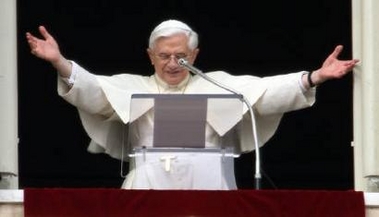|
Pope releases his first encyclical
(AP)
Updated: 2006-01-25 20:15
Pope Benedict XVI said Wednesday in his first encyclical that the Roman
Catholic Church has no desire to govern states or set public policy, but can't
remain silent when its charity is needed to ease suffering around the world.

Pope Benedict XVI greets the crowd gathered in
St Peter's square during his weekly Angelus prayers in the Vatican January
22, 2006. [Reuters] |
In the long-awaited document "God is Love," Benedict explores the
relationship between God's love for mankind and the church's works of charity,
saying the two are intrinsically linked and the foundation of the Christian
faith.
The 71-page encyclical, eagerly watched for clues about Benedict's major
concerns, characterizes his early pontificate as one in which he seeks to return
to the basics of Christianity with a relatively uncontroversial meditation on
love and the need for greater works of charity in an unjust world.
Even Vatican officials have expressed some surprise at the topic, considering
Benedict was the Vatican's chief doctrinal watchdog and could easily have delved
into a more problematic issue such as bioethics in his first authoritative text.
In the encyclical, Benedict said the church's work caring for widows, the
sick and orphans was as much a part of its mission as celebrating the sacraments
and spreading the Gospels. However, he stressed that the church's charity
workers must never use their work to proselytize or push a particular political
ideology.
"Love is free; it is not practiced as a way of achieving other ends," he
wrote.
"Those who practice charity in the church's name will never seek to impose
the church's faith upon others. They realize that a pure and generous love is
the best witness to the God in whom we believe and by whom we are driven to
love."
He rejected the criticism of charity found in Marxist thought, which holds
that charity is merely an excuse by the rich to keep the poor in their place
when the rich should be working for a more just society.
While the Marxist model, in which the state tries to provide for every social
need, did respond to the plight of the poor faster than even the church did
during the Industrial Revolution, it was a failed experiment because it couldn't
respond to every human need, he wrote.
Even in the most just societies, charity will always be necessary, he said.
"There will always be suffering which cries out for consolation and help.
There will always be loneliness. There will always be situations of material
need where help in the form of concrete love of neighbor is indispensable," he
said.
Benedict stressed that the state alone is responsible for creating that just
society, not the church. "As a political task, this cannot be the church's
immediate responsibility," he said.
However, he said the church wants to be involved in political life by helping
"form consciences in political life and stimulate greater insight into the
authentic requirements of justice as well as greater readiness to act
accordingly, even when this might involve conflict with situations of personal
interest."
He said the church was "duty-bound" to offer such a contribution, and that
the lay faithful, who as citizens of the state, are duty-bound to carry it out
through works of charity.
While stressing that the church has no direct political role, he did offer a
prescription for what the state should do.
"We do not need a state which regulates and controls everything, but a state
which, in accordance with the principle of subsidiarity, generously acknowledges
and supports initiatives arising from the different social forces and combines
spontaneity with closeness to those in need," he wrote.

|